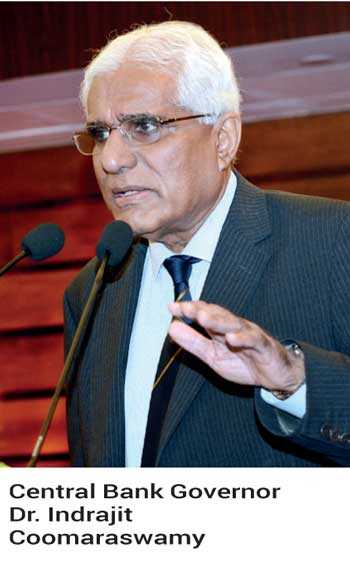Friday Feb 27, 2026
Friday Feb 27, 2026
Monday, 16 September 2019 02:07 - - {{hitsCtrl.values.hits}}
Says proposed MLA critical as SL looks to raise $ 3 b annually from capital markets for debt repayments till 2023
Calls it landmark legislation that will promote CB transparency, accountability
Says inflation targeting regime being enshrined in law will provide policy consistency
If new MLA passed CB Governor to be appointed with Constitutional Council approval
Argues removal of Treasury Secretary will improve CB independence, counter fiscal bias in policymaking
By Uditha Jayasinghe
Passing the new Monetary Law Act is essential to bolstering confidence of international financial markets and rating agencies as Sri Lanka looks to borrow about $ 3 billion annually for the next three years to refinance debt repayments, Central Bank Governor Dr. Indrajit Coomaraswamy said this week, outlining provisions in the proposed legislation to make the monetary authority more transparent and accountable.
Speaking at the Central Bank’s 69th Anniversary Oration Dr. Coomaraswamy renewed his appeal for support to get the new Monetary Law Act passed by Parliament as early as possible, touching upon its importance in ensuring sound macroeconomic fundamentals and provisions to make the Central Bank more independent. The Governor insisted that failure to have macroeconomic discipline was the main reason behind policies being inherently inconsistent and difficult to predict across successive governments since Independence and that the new Monetary Law Act seeks to embed checks and balances by law to have retrained policymaking. 
“It is always important to keep in the back of the mind the precarious situation of the economy. We will have to raise $ 3 billion a year in the next three to four years. So maintaining confidence of rating agencies and international capital markets is critical.
We were able to raise $ 2.4 billion three months after the political crisis and one of the reasons was because we were able to tell bond investors there was a new Monetary Law Act in the pipeline and there were fiscal rules in the pipeline.
“An important part of our narrative was these two pieces of legislation. This was what gave investors’ confidence. The belief among investors that we were moving towards a clear framework for macroeconomic policymaking, which were then going to be institutionalised. That is the message we gave.”
The Governor also defended a provision in the proposed legislation to remove the Treasury Secretary from the governance structure of the Central Bank arguing that other measures have been included to improve the accountability of the Central Bank and removing the Treasury Secretary would assist the Central Bank to be a bulwark against fiscal slippage.
“In modern Central Banking there is a strong conviction that there should be a separation. There should be good coordination between monetary and fiscal policy but you don’t want fiscal dominance in fiscal policy and we have a very strong legacy of fiscal dominance and such forbearance has really not been helpful in terms of getting strong macroeconomic outcomes in the economy.”
He also pointed out that under the new law even the Central Bank Governor would be appointed by the President with the concurrence of the Constitutional Council on the recommendation of the Finance Minister.
The prevailing monetary law was created at a time when there were permanent secretaries and therefore significantly less political interference. However, with Ministry secretaries being appointed by politicians the Treasury Secretary position had become more politicised, Dr. Coomaraswamy noted.
“The Central Bank will be given more independence but it will also be made more accountable if the Governor can be called by Parliament, we will have various publications and we are even thinking of publishing the minutes of the Monetary Board meetings with a lag. So there will be lots of things to make the decision-making of the Central Bank more transparent.”
The new Monetary Law Act was the natural next step to legalising the inflation targeting regime gradually adopted by the Central Bank in the last few years and therefore would provide the much sought after policy consistency demanded by the private sector, Dr. Coomaraswamy contended.
“If the inflation targeting regime is embedded in the law as we would like it to be, on the next day nothing would change. So if nothing is going to change then why do we want this in the law? There we think you have to look at our legacy. The biggest complaint against policymaking in Sri Lanka is lack of consistency and predictability. That is what everyone says. So if the flexible inflation targeting regime is embedded in the law automatically you have greater consistency and predictability.
“For me this is a matter of serious personal conviction. If we want to see macroeconomic policies, which are going to get us out of the highly precarious, we must have sound macroeconomic fundamentals.”